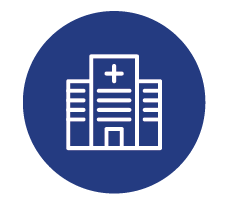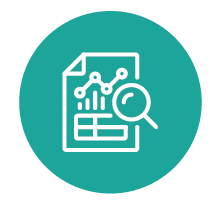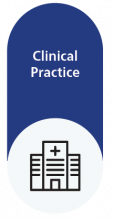Changes in the 2nd edition
In developing this 2nd edition of the framework, we gathered feedback from a wide range of stakeholders, mapped the existing framework capabilities against similar frameworks used in the other UK countries, and reviewed the content with a focus on equality, diversity, and inclusion.
This edition is a refresh rather than a complete overhaul. The existing capabilities have been retained with minimal changes, following stakeholder advice to avoid unnecessary disruption to the sector. The adjustments aim to refine and clarify the framework without altering its core structure or purpose.
Updates to the capabilities
All capabilities remain unchanged from the 1st edition of the framework, except:
- a change to the wording of capability 1.5 in the clinical practice pillar to reflect the merger of Health Education England with NHS England
- a revision of capability 2.1 in the leadership and management pillar to make the importance of inclusion clearer
Figure 1: Changes to the wording of capabilities
Capability number
Clinical practice:1.5
Leadership and management: 2.1
2017 wording
Demonstrate effective communication skills, supporting people in making decisions, planning care or seeking to make positive changes, using Health Education England’s Framework to promote person-centred approaches in health and care.
Pro-actively initiate and develop effective relationships, fostering clarity of roles within teams, to encourage productive working.
2025 wording
Demonstrate effective communication skills, supporting people in making decisions, planning care or seeking to make positive changes, using NHS England’s Framework to promote person-centred approaches in health and care.
Demonstrate and role model inclusive attitudes and behaviours to pro-actively initiate and develop relationships, fostering clarity of roles within teams, to encourage productive working.
Terminology change: ‘advanced practice’ replaces ‘advanced clinical practice’
The 2nd edition uses the language ‘advanced practice’ and ‘advanced practitioner’ rather than ‘advanced clinical practice’ or ‘advanced clinical practitioner’. Feedback indicated that the use of ‘clinical’ in the framework unintentionally gave the impression that advanced practice is a generic role, rather than a distinct level of practice applied across a range of multi-professional roles and contexts. The updated language aims to be more inclusive and representative, recognising that advanced practice takes place in a wide range of settings and professional contexts, including those where the term ‘clinical’ feels less relevant.
The term ‘advanced practitioner’ is an umbrella term encompassing health and care professionals from a wide range of multi-professional registrant backgrounds who work at advanced practice level; exercising autonomous decision making in a context of complexity, uncertainty, and varying levels of risk, holding accountability for decisions made. There are a wide variety of job titles for advanced practitioner roles, but they all commonly involve direct responsibility for high level complex decision making, including complete management of episodes of care. The names of the 4 pillars of advanced practice, including the clinical practice pillar, remain unchanged.
The capabilities are not intended to be limiting and should be read and interpreted in light of the profession and context or sector in which an advanced practice role exists.
Capabilities

Pillar 1: clinical practice
Advanced practitioners working at an advanced level of practice should be able to:
1.1 practise in compliance with their respective code of professional conduct and within their scope of practice, being responsible and accountable for their decisions, actions, and omissions at this level of practice
1.2 demonstrate a critical understanding of their broadened level of responsibility and autonomy and the limits of own competence and professional scope of practice, including when working with complexity, risk, uncertainty, and incomplete information
1.3 act on professional judgement about when to seek help, demonstrating critical reflection on own practice, self-awareness, emotional intelligence and openness to change
1.4 work in partnership with individuals, families, and carers, using a range of assessment methods as appropriate (for example history-taking; holistic assessment; identifying risk factors; mental health assessments; requesting, undertaking, and/or interpreting diagnostic tests; and conducting health needs assessments)
1.5 demonstrate effective communication skills, supporting people in making decisions, planning care, or seeking to make positive changes, using NHS England’s Framework to promote person-centred approaches in health and care
1.6 use expertise and decision-making skills to inform clinical reasoning approaches when dealing with differentiated and undifferentiated individual presentations and complex situations, synthesising information from multiple sources to make appropriate, evidence-based judgements and diagnoses
1.7 initiate, evaluate and modify a range of interventions which may include prescribing medicines, therapies, lifestyle advice and care
1.8 exercise professional judgement to manage risk appropriately, especially where there may be complex and unpredictable events and supporting teams to do likewise to ensure safety of individuals, families, and carers
1.9 work collaboratively with an appropriate range of multi-agency and inter-professional resources, developing, maintaining, and evaluating links to manage risk and issues across organisations and settings
1.10 act as a clinical role model and advocate for developing and delivering care that is responsive to changing requirements, informed by an understanding of local population health needs, agencies and networks
1.11 evidence the underpinning subject-specific competencies – that is, the knowledge, skills and behaviours relevant to the role setting and scope – and demonstrate application of the capabilities to these, in an approach that is appropriate to the individual role, setting and scope

Pillar 2: leadership and management
Advanced practitioners working at an advanced level of practice should be able to:
2.1 demonstrate and role model inclusive attitudes and behaviours to pro-actively initiate and develop relationships, fostering clarity of roles within teams, to encourage productive working
2.2 role model the values of their organisation/place of work, demonstrating a person-centred approach to service delivery and development
2.3 evaluate own practice and participate in multidisciplinary service and team evaluation, demonstrating the impact of advanced clinical practice on service function and effectiveness and quality (outcomes of care, experience and safety)
2.4 actively engage in peer review to inform own and other’s practice, formulating and implementing strategies to act on learning and make improvements
2.5 lead new practice and service redesign solutions in response to feedback, evaluation and need, working across boundaries and broadening sphere of influence
2.6 actively seek feedback and involvement from individuals, families, carers, communities and colleagues in the co-production of service improvements
2.7 critically apply advanced clinical expertise in appropriate faciliatory ways to provide consultancy across professional and service boundaries, influencing clinical practice to enhance quality, reduce unwarranted variation and promote the sharing and adoption of best practice
2.8 demonstrate team leadership, resilience and determination, managing situations that are unfamiliar, complex, or unpredictable and seeking to build confidence in others
2.9 continually develop practice in response to changing population health need, engaging in horizon scanning for future developments (such as impacts of genomics, new treatments and changing social challenges)
2.10 demonstrate receptiveness to challenge, and preparedness to constructively challenge others, escalating concerns that affect individuals’, families’, carers’, communities’ and colleagues’ safety and well-being when necessary
2.11 negotiate an individual scope of practice within legal, ethical, professional and organisational policies, governance and procedures, with a focus on managing risk and upholding safety

Pillar 3: education
Advanced practitioners working at an advanced level of practice should be able to:
3.1 critically assess and address own learning needs, negotiating a personal development plan that reflects the breadth of ongoing professional development across the 4 pillars of advanced practice
3.2 engage in self-directed learning, critically reflecting to maximise clinical skills and knowledge, as well as own potential to lead and develop both care and services
3.3 engage with, appraise and respond to individuals’ motivation, development stage and capacity, working collaboratively to support health literacy and empower individuals to participate in decisions about their care and to maximise their health and wellbeing
3.4 advocate for and contribute to a culture of organisational learning to inspire future and existing staff
3.5 facilitate collaboration of the wider team and support peer review processes to identify individual and team learning
3.6 identify further developmental needs for the individual and the wider team and supporting them to address these
3.7 supporting the wider team to build capacity and capability through work-based and interprofessional learning, and the application of learning to practice
3.8 act as a role model, educator, supervisor, coach and mentor, seeking to instil and develop the confidence of others

Pillar 4: research
Advanced practitioners working at an advanced level of practice should be able to:
4.1 critically engage in research activity, adhering to good research practice guidance, so that evidence-based strategies are developed and applied to enhance quality, safety, productivity, and value for money
4.2 evaluate and audit own and others’ clinical practice, selecting and applying valid, reliable methods, then acting on the findings
4.3 critically appraise and synthesise the outcome of relevant research, evaluation, and audit, using the results to underpin own practice and to inform that of others
4.4 take a critical approach to identify gaps in the evidence base and its application to practice, alerting appropriate individuals and organisations to these and how they might be addressed in a safe and pragmatic way
4.5 actively identify potential need for further research to strengthen evidence for best practice; this may involve acting as an educator, leader, innovator and contributor to research activity and seeking out and applying for research funding
4.6 develop and implement robust governance systems and systematic documentation processes, keeping the need for modifications under critical review
4.7 disseminate best practice research findings and quality improvement projects through appropriate media and fora (such as presentations and peer review research publications)
4.8 facilitate collaborative links between clinical practice and research through proactive engagement, networking with academic, clinical, and other active researchers
The research pillar capabilities have shaped the development of the advanced level research capabilities of the Multi-professional Practice-based Research Capabilities Framework (NHS England, 2024).




